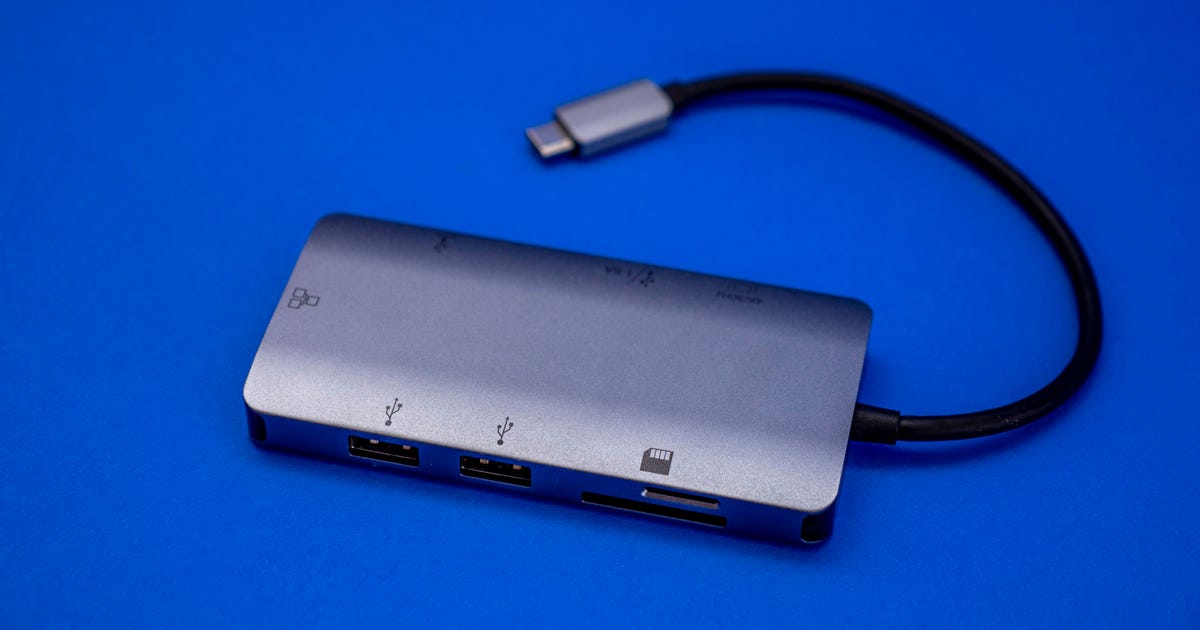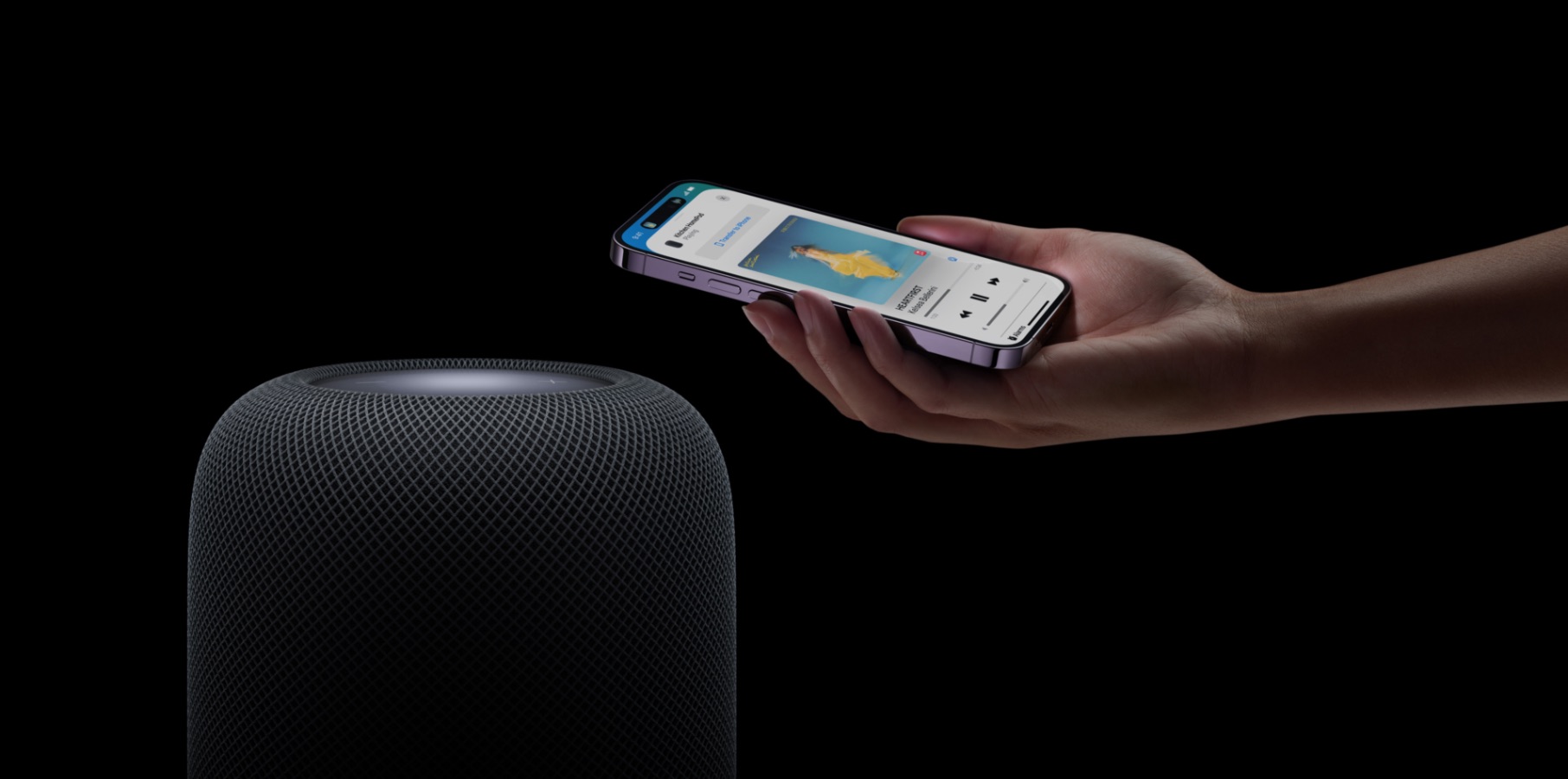USB-C greatly simplified how we connect everything to a computer. A monitor, keyboard, mouse, Ethernet, external storage, microSD and SD cards, and more can all be connected through a USB-C port. Of course, connecting all of those things at the same time through one USB-C port requires a little help from a USB-C hub or dock with multiple ports. There are a lot to choose from, and this list has the best USB-C hubs that we’ve tested.
For those who want a full-featured travel dock, the best USB-C hub is the EZQuest USB-C Multimedia 8-port Hub. There are less expensive options, but the EZQuest combines an excellent assortment of ports, durability for travel and reliability over several months of testing. It even has labels on the top to get your devices connected even faster. EZQuest makes several other USB-C hubs including a 13-in-one model also on this list. However, if a more robust dock with Thunderbolt support is necessary, the best we’ve tested right now is the Accell Thunderbolt 4 Docking Station thanks to an attractive low-profile design and well-rounded port assortment, and it does not get hot when put to full use.
Narrowing down your options and finding the best USB-C hub comes down to knowing how portable you need it to be, your desired data transfer speed and exactly which connections you need. Here are some of our favorite USB-C docking stations that we’ve tested. We’ll continue to update this list as we find new USB hubs and docks to recommend. And if you’re looking to charge your USB-C devices, here are the best options per our testing.
Read more: Best USB-C PD Chargers of 2023
Best USB-C hubs
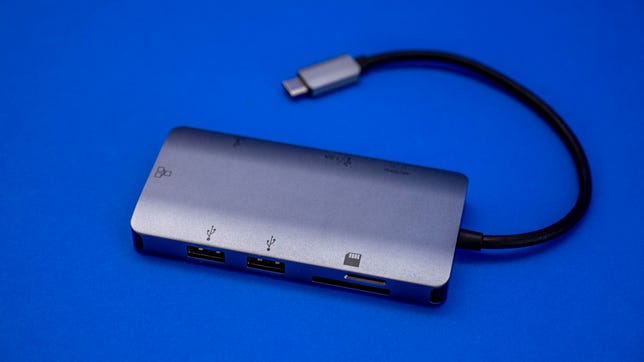
Josh Goldman/CNET
This USB-C hub has all the essentials most would need for office or home use at a reasonable price, especially if your laptop is limited to only USB-C ports. There are three USB-A ports, including one with power delivery, microSD and SD card slots and an HDMI out that supports resolutions up to 4K at 30Hz. At the end is a Gigabit Ethernet connection with an activity LED (something other hubs this size typically leave off). But what sets it apart from others at this size are the handy labels printed on top of the anodized aluminum case.
There is a 100-watt USB-C pass-through for power delivery, with 15 watts used to power the hub. The hub is lightweight, which makes it great for travel, but also means any cords you plug into it could cause it to slide around your desk — a common issue with hubs this size. But if you’re looking for a single hub to cover everything from an external display and wired web access to charging your phone, this has you covered.
You’re receiving price alerts for EZQuest USB-C Multimedia Hub Adapter

Josh Goldman/CNET
We’ve used many Monoprice devices over the years and they’ve regularly delivered more for the money. This slim six-in-one travel dock is no different, giving you just enough to hook up your laptop to peripherals and a monitor up to 4K at 60Hz. Also, should you need an Ethernet port, there is a seven-in-one model for $10 more.

Josh Goldman/CNET
Accell’s slim, low-profile Thunderbolt 4 Docking Station is one of the most compact we’ve tested without sacrificing performance or ports. There are two Intel-certified Thunderbolt 4 ports on the rear as well as a DisplayPort 1.4 connector that, combined, can drive dual UHD 4K monitors at 60Hz or a single 8K display at 30Hz. Another Thunderbolt 4 USB-C port on the front connects to your PC or Mac. The port is shifted all the way to the right so that the cable doesn’t block other ports and makes it easier to keep the cable out of the way.
Three USB 3.1 Gen 2 Type-A ports, a USB 2.0 Type-A port, an SD 4.0 UHS-II card reader, a 3.5mm audio combo jack and Gigabit Ethernet port round out the connection options. And even with the dock fully loaded, it remained relatively cool compared to others we’ve tested.
You’re receiving price alerts for Accell Thunderbolt 4 Docking Station
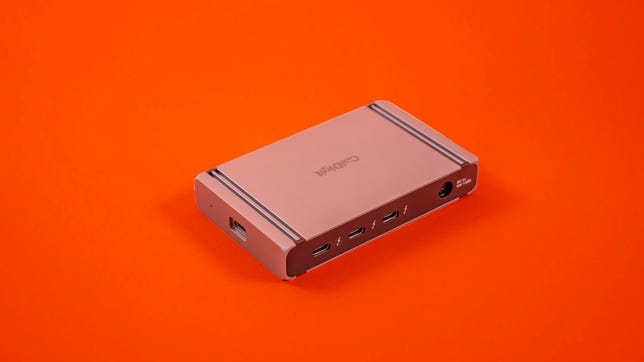
Josh Goldman/CNET
Most people, including me, use hub and dock interchangeably but they are different devices. A hub adds more ports to a computer to attach more devices. The Element Hub, for instance, turns one Thunderbolt 4 port on your laptop into three Thunderbolt 4 ports so you can attach extra displays, high-speed storage and peripherals. It also gives you four USB 3.2 Gen 2 Type-A ports with data speeds up to 10Gbps to add USB-A devices. And the hub can be daisy-chained to another Thunderbolt 4 dock or hub for even more connections.
The included power adapter (it’s actually larger than the hub itself) can deliver up to 60 watts of charging power to attached devices. That’s not enough for more power-hungry laptops but fine for a Chromebook and smaller laptops like a Dell XPS 13 or Apple MacBook Air. You can also disconnect it from your computer and just use it to power up your phone, tablet and other devices.
One other nice touch: CalDigit made the design reversible so you can flip it on your desk to have whichever ports you’d like facing forward.
You’re receiving price alerts for CalDigit Thunderbolt 4 Element Hub
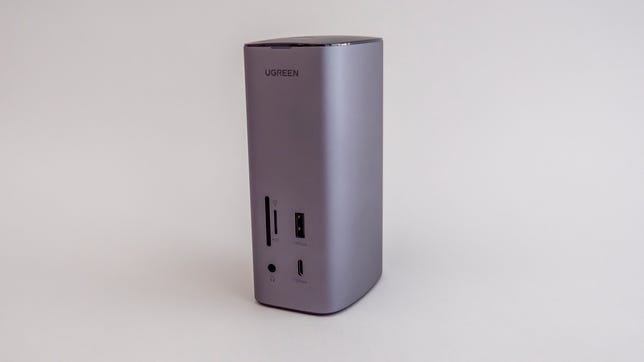
Josh Goldman/CNET
Ugreen’s tiny tower of ports uses a DisplayLink chipset to drive three displays at up to 4K at 60Hz via its DisplayPort and dual HDMI outputs with Windows or MacOS systems. Windows users can opt to run one display at up to 8K at 30Hz plus two at 4K at 60Hz.
DisplayLink software is required to drive the displays properly. There’s also no power supply included, just a USB-C cable. If you’re using it with a laptop with a USB-C power adapter, you can use it to power the dock. It supports up to 100-watt power delivery letting you charge your laptop as well as power the dock.
It handles more than displays, too, with one 10Gbps and two 5Gbps USB-A ports, a 10Gbps USB-C port, a combo headset jack, Gigabit Ethernet and SD and microSD card slots. The minimal footprint helps keep your desk tidy, and it’s light enough to travel with if you needed to (but there are better options for that on this list).
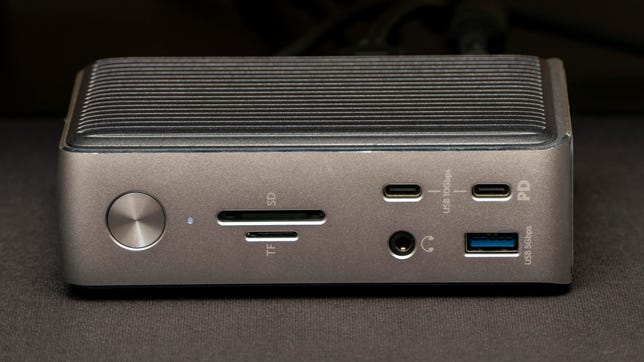
Josh Goldman/CNET
The PowerExpand Elite is part USB-C dock and part charging station. In back are 85- and 15-watt Thunderbolt 3 ports and in front is an 18-watt USB-C power delivery port. A Thunderbolt 3 port supports up to a 5K-resolution display at 60Hz while its HDMI 2.0 port can support a display up to 4K resolution at 60Hz. Or you can run a USB-C-to-HDMI dual splitter and connect two 4K displays at 30Hz so you can run up to three monitors between the HDMI port and Thunderbolt 3 ports.
You’ll also have four USB-A ports, a Gigabit Ethernet jack and MicroSD and SD card reader. A 3.5mm combo jack handles audio output and input.
To provide enough juice to run everything, though, the PowerExpand Elite has a large 180-watt power adapter. Also, the fanless design means the body is one big heat sink so it can get hot when it’s fully loaded. You can stand it vertically to help keep it cooler.
You’re receiving price alerts for Anker PowerExpand Elite Docking Station
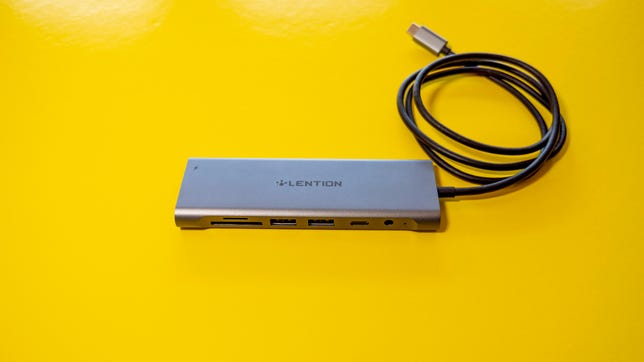
Josh Goldman/CNET
Most small USB-C hubs have short attached cables. That’s fine if your laptop is on a desk and not on a laptop stand and that desk has plenty of space directly next to your laptop’s USB-C port. For those who could use some extra cable reach, though, the Lention C37 is ideal.
The USB device is still compact and lightweight but has a 1-meter cable (3.3 feet). It has dual USB-C ports with 60-watt power delivery, two USB-A ports, microSD and SD card slots and a 3.5mm headphone jack. On the end is an HDMI output that supports 4K at 30Hz or lower resolutions at 60Hz. This is also a great option for desktops that are kept on the floor.
You’re receiving price alerts for Lention CB-C37 USB-C Hub

Josh Goldman/CNET
The Ultimate Plus shows off just what’s possible with a single USB-C port. Along with four USB 3.0 type-A ports, there are microSD and SD card slots, a 3.5mm combo headset jack and a Gigabit Ethernet jack. But the biggest reason to choose this model is its support for three displays.
There are two full-size HDMI outputs joined by an old-school VGA output. The VGA can only handle outputting at 1080p, but one HDMI can output at resolutions up to 4K at 60Hz while the other can output up to 4K at 30Hz. That’s a lot for one compact desktop dock and a single connection to your laptop or desktop.
In our tests, it lived up to its promise of handling all of its connections at once. The ports might not offer the fastest speeds of other docks (the USB-A ports top out at 5Gbps for example), but if three monitors and a lot of extra connections on your desk are what matters, this is the dock for you.
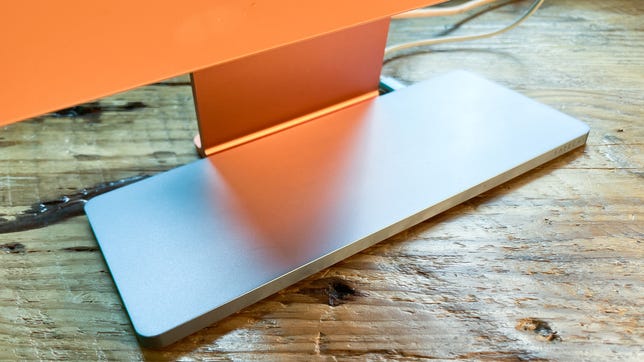
Dan Ackerman/CNET
This add-on dock slides right over the foot of a 24-inch iMac. It includes USB-A and USB-C ports, plus slots for both microSD and SD cards and even an internal slot for an M.2 storage drive. The 11-inch wide dock also has the exact footprint as the iMac’s color-matched keyboard, so that can sit on top of the dock/foot combo when not being used. At $150, it’s a little on the pricey side, and there are no HDMI or DisplayPort outputs. But if you’re looking for a tidy solution to add some extra ports to an iMac, this is a sweet solution.
You’re receiving price alerts for Satechi USB-C Slim Dock for 24-inch iMac
Is a USB-C port the same as a USB port?
The USB port most are familiar with is USB Type-A. Sometimes called a standard or regular USB port, it is rectangular and directional which requires you to properly align tabs inside the connectors. The newer USB-C port is a small oval that uses a reversible connector so that you don’t need to flip it around to get the correct position.
Are all USB-C ports the same?
While USB-C ports may appear the same from device to device, they are not. Even USB-C ports on the same laptop might have different capabilities. For instance, Thunderbolt 3 or 4 devices will only be fully supported by a computer with the corresponding Thunderbolt USB-C port. Unfortunately, you can’t just look at the port and know exactly what you have. Check with your computer manufacturer for what your laptop (or desktop) model supports before you buy a USB-C dock or adapter.
#USBC #Hub #CNET
